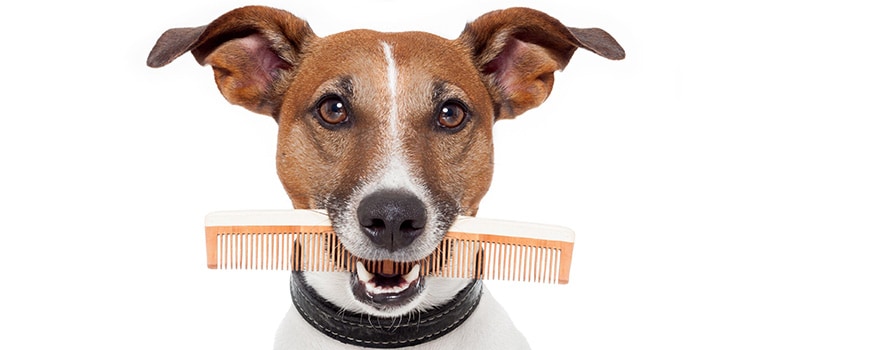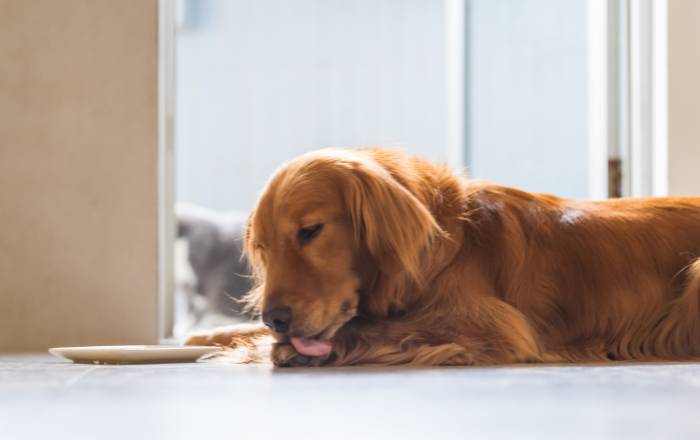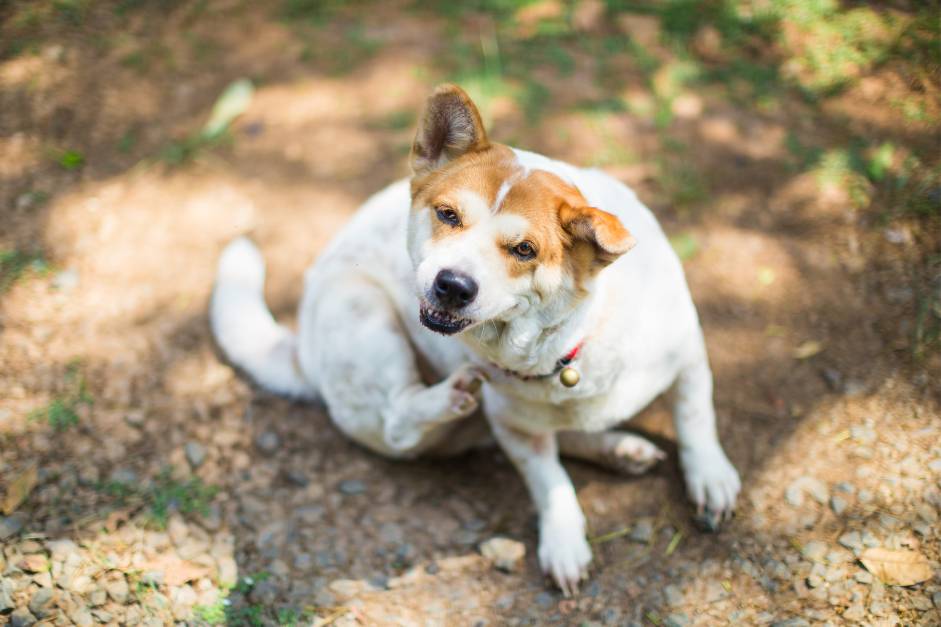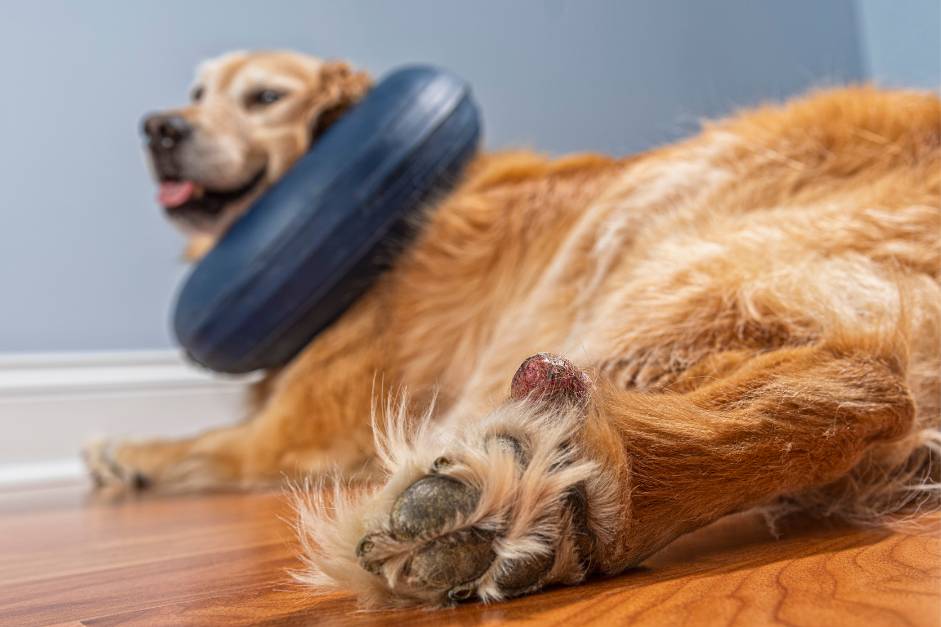Licking their paws now and then is a very normal action for dogs, but when it becomes excessive it might be a warning sign.
Is your dog constantly licking its paws? This behavior can be bothersome and indicate underlying issues.
Your dog may be licking its paws for a variety of reasons, some of which you may be able to treat at home depending on how often and how your dog is licking its paws.
Now, you are worrying about, how to prevent your dog from licking its paws.
Cover with socks, or shoes, wash and moisturize your dog’s paws, stick to a grooming schedule, use an Elizabeth collar, and see your doctor if required to prevent your dog from licking its paws.
To help our readers understand more about what’s behind this odd behavior of their dog, we’ve put together a detailed guide.
Here, we’ll go over some of the most frequent reasons dogs lick their paws excessively, as well as some great preventative actions you can do to ensure your dog’s paws stay healthy and happy.
Common Reasons Why Dogs Lick Their Paws
Excessive paw licking can be triggered by various factors, including:
-
Infections Caused By Bacteria And Yeasts
Infections with fungi and bacteria are a common reason why dogs lick their paws excessively.
Ringworm, a kind of localized fungal infection, is extremely infectious and can have severe consequences. The intense itching brought on by fungal dermatitis encourages the dog to lick even more.
It might be an infestation of fleas, ticks, mites, or lice that is bothering your pet. When dogs spend time outside, they are significantly more susceptible to these diseases.
An antibiotic or antifungal treatment can be used to disinfect their paws before they come inside after outside play.
-
Injuries
Examining the paws to check sure there is no damage, such as a cut, ripped nail, growth, or maybe a stone, thorn, or ice ball caught between the pads, is the first thing to do, especially if the licking begins very quickly and is focused on one paw. Check the tops of the feet, the spaces between the toes, and the condition of the nails.
Your dog’s paw may have been injured because he stepped on a sharp object, walked on salted or heated pavements, was stung by a bee, or had a blister. Some of these issues may be remedied with basic first aid, while others may call for the expertise of a vet.
-
Arthritis
Licking the paws is a natural way for dogs to relieve discomfort. A condition like arthritis might be to blame if there is no external sign of injury. You should check your senior dog for arthritis if you live in the United States.
-
Itchy, flaky, Dry Skin
Dry skin can cause itching in dogs, especially during the colder, drier months of winter. Hyperkeratosis of the paw pads is a condition that can affect dogs of any age but is more common in puppies. Limping is a common symptom of this skin disorder because of the discomfort it causes.
-
Dermatitis
A skin ailment (dermatitis) might be the cause of the licking if the paw pads and feet look fine. Dermatitis can be brought on by bacterial issues, allergies, or dietary sensitivities. Dogs that are sensitive to yard pesticides, de-icing salts, or even just some varieties of grass or weeds might develop dermatitis.
-
Imbalance Of Hormones
Insufficient thyroid hormone (leading to hypothyroidism) or excess cortisol are the most common causes of hormonal imbalance in dogs. Both of these disorders, if left untreated, can increase the likelihood of itching, baldness, and red patches on the skin. Licking these areas excessively increases the risk of secondary infections. Due to the complexity of diagnosis, if you feel your pet has a hormone imbalance, you should take them to the vet immediately.
-
Parasites
Itchy paws may be the result of a parasite infestation, such as fleas or mange. The itching should stop after the parasites are treated, which your vet may advise on.
-
Tumor Or Cyst
A cyst is a sac-like development that is typically produced between the webbing of the toes and is filled with fluid or air.
It can lead to swelling, redness, and an uncomfortable sensation that makes the puppy want to scratch. Typically, they will be located on the front paws.
Paw-licking relieves itching, but momentarily. In addition to making your dog uncomfortable, cysts can cause severe discomfort.
These can be caused by things like obesity, ingrown hairs, and other skin disorders.
-
Allergies To Food
Food allergies are a common cause of scratchy paws in pets, but they can be hard to diagnose. To treat the issue, your veterinarian may recommend changing your dog’s diet or removing certain substances.
-
Behavioral Problems
After you and your vet have ruled out physical causes, your dog may be experiencing behavioral issues due to boredom or anxiety. Once again, this is challenging to identify, but there are things you can do to help. Some dogs exhibit obsessive tendencies, such as licking their paws.
If your dog seems bored, consider giving him or her more physical and mental exercise by taking him or her on more walks, runs or playing time with you and other dogs. To prevent him from chewing up your furniture, try distracting him with puzzle toys or safe chew toys.
There are a variety of things you may try, such as soothing treats, if you suspect anxiety, including the dread of sounds or separation anxiety, is the reason he is licking his paws. A qualified animal behaviorist can provide several suggestions.
Tips For Preventing Excessive Paw Licking
The following is a list outlining the best practices for discouraging canine paw licking:
- Check your dog’s paws frequently for wounds, cracks, and foreign objects.
- Dog booties, or even just a little sock, can be used to prevent your dog from licking its paws.
- After going on a walk or playing in the rain, wipe the paws off with a moist cloth to keep them clean.
- A basic moisturizer or balm may be the best treatment if dryness is the cause of your dog licking its paws.
- Make sure your dog gets all the nutrients it needs by feeding it a healthy, well-balanced diet.
- If you believe your pet has a food allergy, talk to your doctor about hypoallergenic diet options. If your pet licks excessively, it may be due to an allergy to anything in its surroundings or its diet.
- Keep your house clean and tidy to reduce your exposure to allergies.
- The fur around your dog’s paws might mat and trap moisture if you don’t regularly groom him.
- Make sure your dog gets enough exercise and mental stimulation daily.
- To prevent additional infection in your dog, your vet may suggest using an Elizabethan collar, also known as an e-collar, to stop the licking immediately.
- If the paw-licking problem persists or worsens, go to your vet or an accredited animal behaviorist.
Take A Way
It is crucial for dogs’ health and well-being that excessive paw licking be avoided. You may help your furry companion have a better, healthier life by learning the causes of this behavior, seeing the warning signs, taking preventative measures, and consulting a specialist when required.
If you need help or more information, talk to your vet or a trained dog behaviorist.




